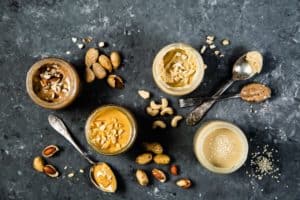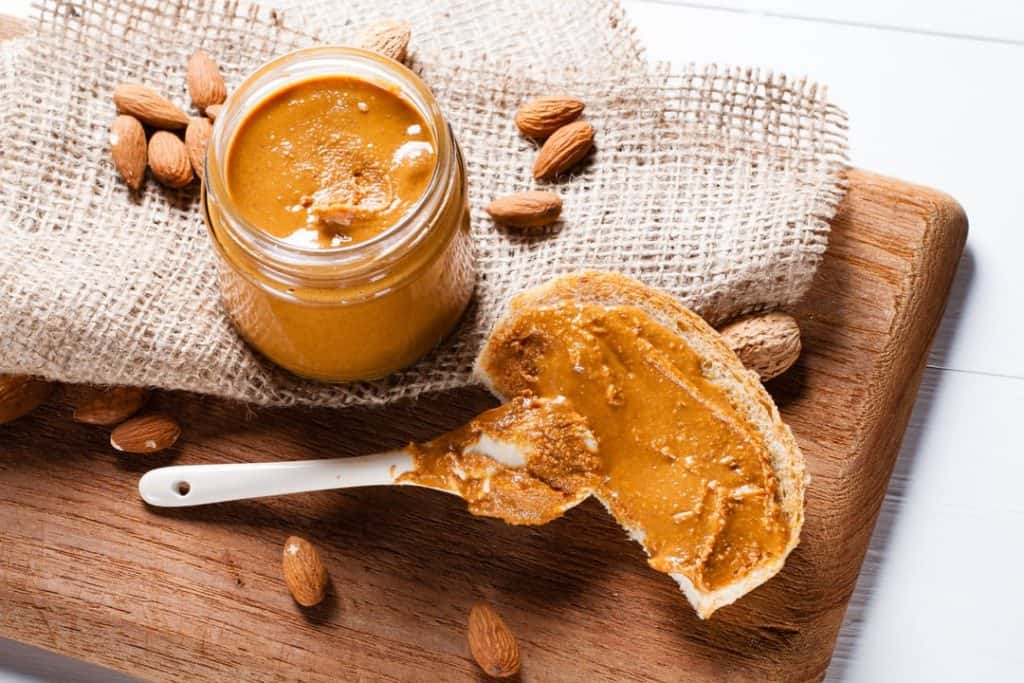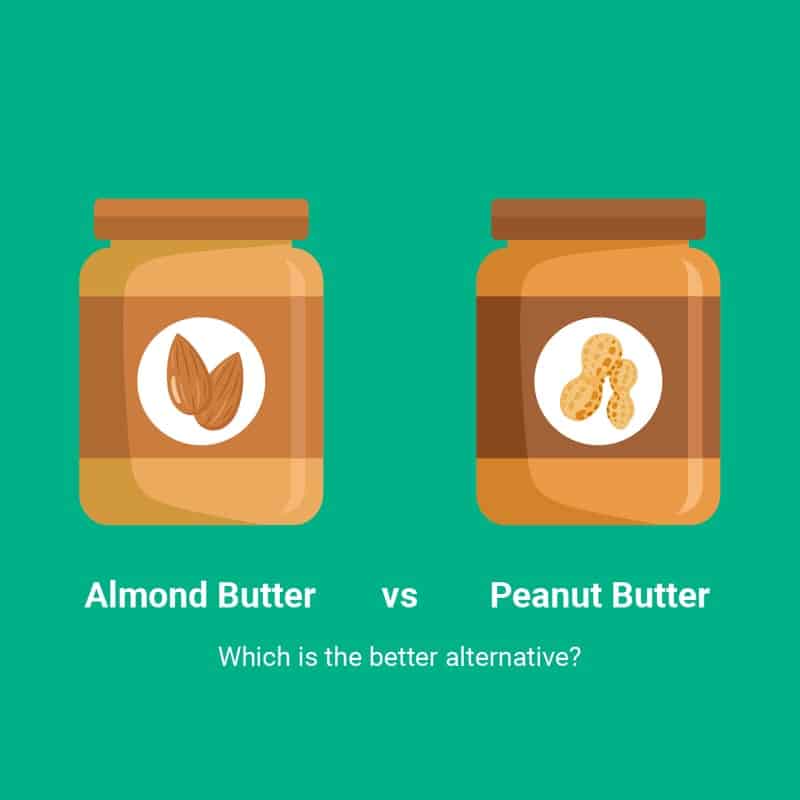Is Almond Butter Healthy?
Just a glance at the almond butter nutritional information seems to suggest that there’s a lot of bang for your buck. From just one tablespoon, there’s large amounts of vitamin E, magnesium, manganese, phosphorus, and a good kick of protein. But with all that fat too, is almond butter healthy?
The answer is primarily yes because the fat in almond butter is mostly monounsaturated fat, which is essential for good health. This is also true of peanut butter. In fact, most nuts contain large amounts of monounsaturated and polyunsaturated fats, plus omega-3 fatty acids, which may increase cardiovascular health and reduce “bad” cholesterol.
Almond Butter Health Benefits
So, what are the actual benefits of all these nutrients in almond butter? Let’s pick out three micronutrients that are found in large amounts in almond butter: Vitamin E, Magnesium, and Manganese.
Vitamin E
Vitamin E is a fat-soluble micronutrient with the following benefits:
- Maintains healthy skin
- Good for eye health
- Boosts the immune system
- May help prevent memory loss
- May reduce inflammation
Magnesium
Magnesium is a vital mineral. Its functions include:
- Help transform food into energy
- Regulating hormones
- Maintaining bone health
Manganese
Manganese occurs naturally within the human body, but we also need some from our diet. Benefits include:
- Proper bone growth
- Potential disease prevention due to the antioxidant action
- May help control diabetes by regulating insulin production
- Boosts metabolism

Almond Butter vs. Peanut Butter
Peanut butter is no slouch when it comes to nutritional value. It is high in protein, fiber, good fats, and micronutrients, plus peanut butter is a great energy-boosting snack- and delicious! So, which is better? Almond butter or peanut butter?
Fats
Both almond butter and peanut butter are high in fat- the good kind. Both have around 8 to 9 grams of fat per serving (one tablespoon); however, peanut butter has about 1.5 grams of saturated fat, which is the kind you want to limit. Almond butter has about 0.9 grams of saturated fat, meaning it also has more of the beneficial monounsaturated and polyunsaturated fats.
This means that if you’re concerned about your saturated fat intake, almond butter would be the clear choice.
Calories
In this instance, there’s not much between the two. Peanut butter gives 95 calories per tablespoon, while almond butter provides 93. So, if you were eating peanut butter in large volumes, you would notice a difference. But in small servings, they’re virtually the same.
Protein
Both nut butters provide 3.4 to 3.5 grams of protein per tablespoon. That makes them both excellent choices for anyone wanting to ramp up their protein intake or who needs a snack before or after exercise.
Sugar Content
Both types of nut butter have a negligible amount of sugar. There is a tiny amount naturally occurring in both peanuts and almonds, but it’s little enough to consider almond butter and peanut butter both sugar-free snacks.
That is, of course, if you’re buying or making unsweetened butters. Check the pack; lots of nut butters have added sweeteners or sugar, and these will affect the nutritional content.
Micronutrients
The main difference between peanut butter and almond butter is the vitamin and mineral content. Almond butter has about double the amount of iron, and more than double the amount of vitamin E. Peanut butter has a little more folate, the naturally occurring form of folic acid.
Final Verdict
As always, it really depends on what you need from your food. If you’re trying to reduce your saturated fat intake, almond butter has the advantage, with around two thirds the amount of saturated fat compared to peanut butter. They provide the same amount of calories and protein but have slightly different nutritional composition. Overall, it would seem that almond butter is a winner with the additional iron and vitamin E content.
Always discuss your nutritional requirements with a professional before any drastic changes in your diet.
Almond Butter Serving Suggestions
Almond butter can be spread thickly on toast or put in a sandwich with your favorite grape jelly, just like regular peanut butter. Here are a few other ideas:
- Almond butter cups, an alternative to peanut butter cups
- Marinate meat in a mix of almond butter and spices
- If you make your own hummus, replace some of the tahini with almond butter
- Use almond butter to thicken smoothies or milkshakes
- Make protein bites with almond butter, protein powder and natural flavorings like coconut
- Warm almond butter and chocolate in a pan and drizzle over ice cream

Almond Butter Allergies and Interactions
Tree nuts are one of the major food allergens in America today. Some people think that if you are allergic to peanuts, you’ll be allergic to other nuts too. This is not always the case, as peanuts are legumes, and almonds and most other nuts are tree nuts, which are a different kind of seed.
Having said this, it is often recommended that nut allergy sufferers avoid all nut products due to the risk of cross-contamination in factories that produce nuts. Basically, if your almond butter comes from a factory that also produces peanut butter, there’s a small chance that a tiny amount of peanut dust could end up in the almond butter (or vice versa). As even a small amount can cause a severe allergic reaction, the safest option is for nut allergy sufferers to avoid all nuts unless they’ve discussed it with a doctor or allergist.
Other Alternatives to Peanut and Almond Butter
There are plenty of other nut and seed butters out there– all nutritious in their own way. Here are just a few alternatives if you either can’t have or don’t enjoy peanut butter or almond butter.
- Walnut butter: high in omega-3 fatty acids, beneficial for heart health.
- Cashew butter: lower in fat than almond or peanut butter and high in copper, which helps the body process iron.
- Brazil nut butter: high levels of selenium which may help in DNA repair.
- Tahini: Made with sesame seeds, and usually much runnier than other nut and seed butters.
- Coconut butter: Contains more fiber than coconut oil and may have antiviral properties.
 Remember, if you buy your nut butter at the grocery store, always check for added salt or sugar, or any other hidden additives. The best nut butters for good health are unsweetened and contain minimal salt.
Remember, if you buy your nut butter at the grocery store, always check for added salt or sugar, or any other hidden additives. The best nut butters for good health are unsweetened and contain minimal salt.
Both almond butter and peanut butter are high in calories, protein, and beneficial fats. They both provide many nutrients with benefits, including potentially improved cardiovascular health. Almond butter has slightly less saturated fat plus more vitamin E and iron.





